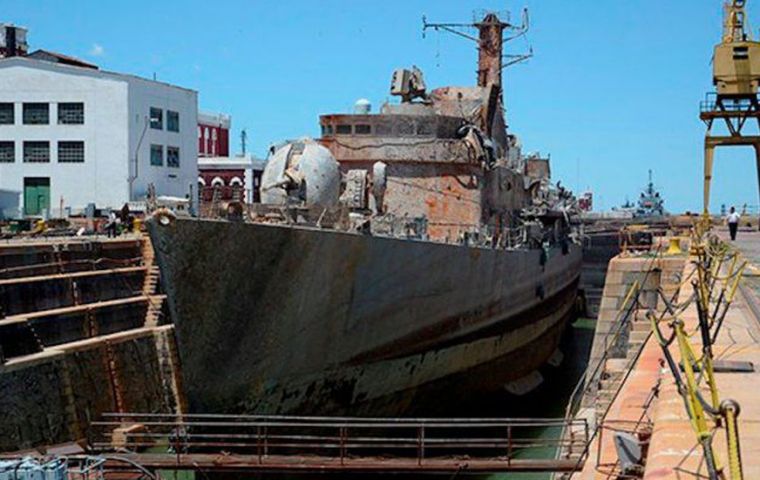MercoPress. South Atlantic News Agency
Argentine court halts scrapping of Navy ship involved in 1982 Stanley landing
 Although built in Argentina, the ARA Santísima Trinidad was a twin to Britain's Sheffield, sank in 1982
Although built in Argentina, the ARA Santísima Trinidad was a twin to Britain's Sheffield, sank in 1982 An Argentine court ruling halted the scrapping of an Argentine Navy vessel involved on April 2, 1982, landing at the Falkland Islands. War Veterans had been critical of President Alberto Fernández's decision regarding the fate of the vessel.
The destroyer ARA Santísima Trinidad (D2), built-in Argentina based on a British model, was the flagship of Operation Rosario, carrying the amphibious commandos who led to the surrender of Port Stanley's garrison.
Bahía Blanca Federal Judge Walter López Da Silva Thursday ruled in favour of an appeal filed by private citizen Jorge Oliver requesting that the ship be “protected” from its sale as scrap metal.
Oliver's legal undertaking is one of many brought forward by former crew members and civil activists of the “Malvinas” cause after the publishing of the presidential decree, which was labelled as “unpatriotic.”
The court ruling halts the call for bids for the purchase of lag material that the Navy had in progress by what was ordered by Decree 1017/20.
The case was originally filed in Córdoba but it was then shifted over to Bahía Blanca citing jurisdiction issues because the vessel is docked at the Puerto Belgrano naval station.
The lawsuit against the presidential decree was grounded on Law 25,197 (Regime for the Registration of Cultural Heritage) to prevent the destruction of the historic ship which should instead be restored and turned into a museum.
According to Oliver's presentation, “the November 20 foundation is in optimal conditions to face the maintenance and enhancement of the naval unit.”
Navy lawyers had denied the vessel was a part of the Nation's cultural heritage. “Due to its enormous deterioration and its null economic value, it was decided to proceed with a scheduled sinking with honours” (a naval tradition whereby ships can be used as firing targets) adding that ”in the end, this was discouraged because the fragility of the hull prevents transit the entry and exit channels to the port of Bahía Blanca are safe since the shipwreck would complicate navigation in the area.
The Navy also maintained that if placed in the hands of civilians, the ship would have to comply with all naval security requirements.
In the end, Judge López Da Silva did believe the ARA Santísima Trinidad was a historical asset and therefore so much a member of the Argentine heritage and it is now up to the Secretary of Culture to “exercise superintendency over said heritage.”
The Santísima has been refloated following a partial sinking in 2013 but according to naval authorities, her condition is unrecoverable and constitutes a threat to nautical safety, while plans to transform her into a museum have been under consideration for over two decades among war veterans.
The ship belongs to the Type 42 class. Construction was ordered on March 1, 1969, to be executed at the Río Santiago Naval Shipyard based on an English design (it was in fact twin to the UK's Sheffield sunk by Argentine forces in 1982).
The Santísima was launched Nov. 12, 1974, and it was decommissioned in December 2004. Since then, she has remained moored at the Puerto Belgrano Naval Base.




Top Comments
Disclaimer & comment rules-

-

-

Read all commentsThey never cease to surprise do they ? A miserable failure by a thoroughly disgraced and discredited government , a rusting rotting hulk abandoned since the war - so let's make it a National Monument ! A very fitting monument perhaps ? A monument that perfectly portrays a failed nation, whose citizens have consistently been betrayed by their leaders who have squandered the enormous natural wealth of the country. Yes, a useless, unsafe, rotting hulk is a very fitting National Monument.
Sep 24th, 2021 - 11:50 am +2Actually I though the Carrier was their flagship that morning offshore? Where on earth would they raise the money from to restore this rusting hulk anyway- looks like $20 million and a lot lot more!
Sep 24th, 2021 - 12:32 pm +2But agree- crazy nation and crazier politicians.
Yep, the ship looks about ready to ‘topple’ all right.
Sep 25th, 2021 - 11:48 am +2Also, the Falklands are not and never have been Argentinian, doesn’t look like they ever will be either.
UK diplomatic note to the UN, 27/1/2012
‘British sovereignty over the Falkland Islands dates back to 1765, some years before the Republic of Argentina even existed’.
‘The Islands have never legitimately been administered by, or formed part of, the sovereign territory of the Republic of Argentina’.
By the way, how far is it from Portugal to Brazil???
And Calais is French these days.
Commenting for this story is now closed.
If you have a Facebook account, become a fan and comment on our Facebook Page!